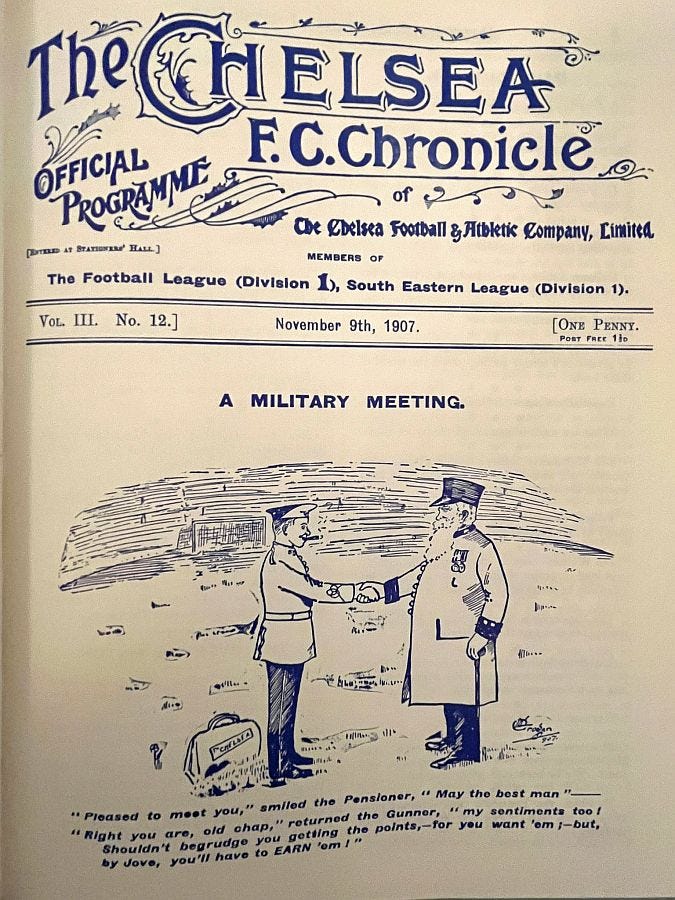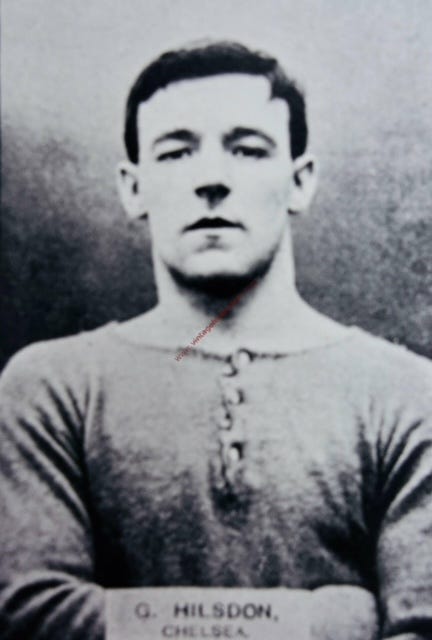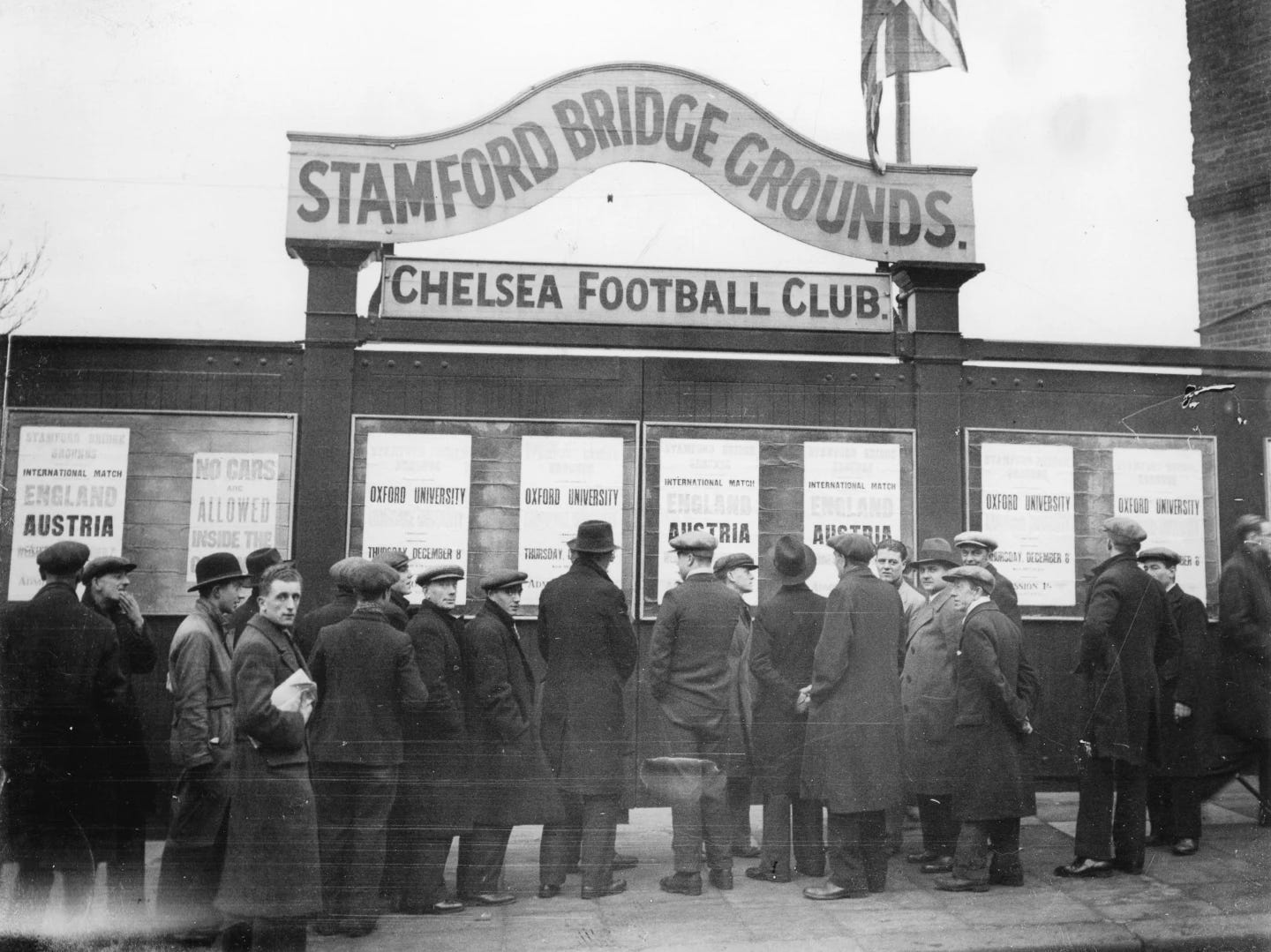The first ever top-flight London derby
A young munitions factory worker attends his first football match - and it's one to remember.
A cold wind whips across south London one November afternoon. The mass of football supporters converging don’t seem to mind, though: the crowds, the movement and the anticipation all combine to warm them up in spite of it all.
Weaving his way nervously through the home supporters is a young munitions factory worker, Thomas. He’s been saving up for a ticket to see his local side, Woolwich Arsenal, and rather than wait until the Gunners’ next home game, he’s been persuaded by a Chelsea-supporting friend to head to Stamford Bridge to experience a piece of football history.
He’s already starting to wonder whether it was a wise idea. He’s never seen so many people in one place, and has to stand on tiptoes to peer over the heads to find the right gate.
Wrapping his coat tighter around himself, Thomas pushes through the crowd and finds himself at a gate, the imperious redbrick walls of the stand towering above him. He has no idea whether it’s the right one, but there is no way he can push back the way he’s just come. He can hear a man behind grumbling about someone having stepped on his foot. Time to go in.
He hands over his money and heads inside the stadium, adding an extra penny to get a copy of The Chelsea FC Chronicle.

The cover depicts a Chelsea pensioner shaking hands with a soldier smoking a cigarette. He squints at the caption.
‘Pleased to meet you,’ smiled the Pensioner, ‘May the best man–’
‘Right you are, old chap,’ returned the Gunner, ‘my sentiments too! Shouldn’t begrudge you getting the points, for you want ‘em, but, by Jove, you’ll have to EARN ‘em!’
All the talk in the days leading up to this game - including in the newspapers - has been about how Woolwich Arsenal are the favourites for this fixture. An established First Division side since 1904-05, the Gunners are trailblazers in bringing professional and League football to the south of England. Chelsea, on the other hand, were only founded in 1905 and fresh to the First Division.
Thomas chuckles at the caption on the cover, but is brought back to reality by the crowd urging him forward towards the pitch. After several minutes of confusion, he finally finds himself on the terrace with a reasonable view of the playing area. There is a buzz of anticipation around the place, men laughing and joking, or studying their programmes carefully.
Two men directly behind him are discussing the likely outcome.
“I think we’ll do it today, you know,” says one.
“I’m glad you’re confident,” replies his friend, with a resigned laugh.
“Granted, it’s been tough so far, but if Hilsdon’s scoring, we’ll be fine. I say 2-1 to Chelsea.”
“I’d be happy with that.”

Chelsea are playing the 11th game of their inaugural season in the First Division – the top tier of English football. Having been elected to the Second Division in 1905 – just months after being founded – the Blues quickly settled at the national level and were promoted in the 1906-07 season as runners up to Nottingham Forest. George Hilsdon was the team’s top scorer with 27 goals.
The 1907-08 season has not started well. It took four attempts for manager David Calderhead’s team to register their first points, with a 2-0 victory over Newcastle United. They’ve only managed one win and a draw since then, meaning that going into their 11th game of the season, Chelsea are bottom of the league, threatening them with an immediate return to the Second Division.
For this match, though, the fans around Thomas seem less worried about their team’s position and more excited about the prospect of the opposition.
Fellow South London side Woolwich Arsenal are visiting Stamford Bridge for the first time ever in a league match. This is also the first ever meeting of two London-based professional football teams in the First Division.
Arsenal have had a slightly better season than Chelsea so far, but their start was even worse. The first three games were all lost with an aggregate score of 0-14. Since then, though, the Gunners have lost only once more and are now comfortably mid-table.
As 3pm approaches, David Calderhead leads his team out onto the pitch to a deafening roar. The Woolwich Arsenal team, led by manager Phil Kelso, are alongside them. The players line up. The first top-flight London derby is about to kick off.
The noise swells as Chelsea get the game started. Newspaper reports later describe the atmosphere as more like a cup tie than a league match, reflecting the significance of this first league meeting between these two London teams.
The first 15 minutes are played at a hectic pace. Both sides are evidently keen to stamp their authority on this budding local rivalry.
Arsenal’s defenders, Archie Gray and Jimmy Sharp, appear unflustered by the manic nature of the opening exchanges and deal confidently with much of Chelsea’s pressure. Just after the quarter of an hour mark, however, the home side get the breakthrough.
Chelsea’s speedy attacker Norman Fairgray finally gets the better of the Arsenal halfbacks, unleashing a low shot that Arsenal goalkeeper Jimmy Ashcroft has to stretch to turn around the post for a corner. Thomas gasps as fans around him surge forward in anticipation of the ball hitting the net, and he stumbles trying to keep his footing. An older man behind him catches his arm and hauls him upright.
“First time?” the man grins. Thomas nods, smiling sheepishly, and returns his attention to the pitch.
Fairgray jogs across to take the set piece and delivers a perfect cross for last season’s top scorer George Hilsdon to head towards goal. The header isn’t his best, but it glances off a defender and out of Ashcroft’s reach to put Chelsea 1-0 to the good.
The roar is deafening. This time, Thomas is slightly more prepared for the surge and goes with it, faking a smile as best he can as the Chelsea fans around him cheer and punch the air. This is not quite what he expected.

The home side are definitely up for this and continue to keep Arsenal pegged back in their own half.
Arsenal grow into the game but are still struggling to break Chelsea down. This may be the first time he’s seen top-level football, but even Thomas can tell his team aren’t as fast as their opponents.
Reports later describe Arsenal’s approach as “too scientific” or “methodical”, while Chelsea are using another tactic as well as pace to keep Arsenal at bay: they’re also nasty. Some lazy kicks are aimed at attackers – it’s a good job Chelsea soon shook that habit.
Arsenal force some corners but the home defence is well organised. Chelsea goalkeeper Bob Whiting is forced into a reaction stop following a corner as Arsenal’s Peter Kyle shoots through a crowd of players. The crowd’s reaction makes Thomas jump.
The teams go in at the break with Chelsea still leading by that single goal.
There’s no chance of Thomas moving around the packed terrace, so he squeezes his hand into his coat pocket and pulls out the programme again. He reads an account of Chelsea’s last home game, a 2-1 win over Everton, with James Windridge scoring both the goals. He thinks he recognises which player Windridge is, and hopes that the Woolwich Arsenal defenders can keep him quiet.
Chelsea start the second-half as they started the first, at a high pace, putting Arsenal’s Sharp in particular under significant pressure. Outside forward Martin Moran creates a couple of chances that go begging.
Up the other end, Woolwich Arsenal’s David Neave is denied a penalty after being, surprise, surprise, kicked over in the area. Thomas mutters something his mother would disapprove of under his breath. With decades to go before the invention of television, never mind VAR, there is no hope of convincing the referee to change his decision. (There is no historical record as to whether the away supporters chanted “who’s the wanker in the black”.)
Neave creates another opportunity, this time for Tim Coleman, but the forward fluffs his lines and an equaliser continues to evade the visitors. It’s all Thomas can do not to wince too obviously as the ball runs away from danger.
It is a miss that is soon to prove costly as Chelsea double their lead, again through Hilsdon, who pokes home following a goalmouth scramble. There is another deafening roar and a surge forward, and Thomas overhears the man from before kick-off yelling to his friend: “See?! Hilsdon! I told you!”
A Chelsea player is injured during the scramble, and with substitutes – and ridiculously large squads swelled by reckless spending – not yet invented, Arsenal see a chance to get back into the game against 10 men.
The Gunners almost immediately make their numerical advantage count, with Charlie Satterthwaite hammering the ball home to halve the deficit. Thomas misses the moment as he’s trying to edge his way back to his original spot on the terrace, and initially curses again (that would get you a clip round the ear from Mother, he thinks). He tries to hide a smile while joining in with the ripple of polite applause that greets the visitors’ goal.

Attempting to make up for his earlier miss, Coleman sends a rasping shot just over the bar, but it is not to be. Arsenal’s first experience of a top-level London derby ends in defeat.
As Thomas makes his way home across south London, he soon shakes off his disappointment at the result by rerunning all the key moments from the game in his head. He’s sure Arsenal were robbed of at least a point.
One other thing is certain: this will not be his last game as a supporter.
“That was the last effort of the Plumstead players, who retired a deservedly beaten side, beaten by a side who showed a splendid appreciation of the value of getting straight to goal as quickly as possible, and which refused to indulge in those niceties of the game which do not pay in league struggles of the present day.”
(A reporter for Lloyd’s Weekly News describes Chelsea’s shithousery, 10 November 1907.)
Thomas also attends the return fixture, at Arsenal’s Plumstead Common ground in Woolwich, but the game doesn’t deliver quite as much excitement and finishes 0-0. There is equally very little to separate the two teams at the end of the season, with both finishing on 36 points – just three points above the relegation zone.
Notes:
The Chelsea FC Chronicle and the names of the Chelsea players were sourced from a rather excellent Chelsea history website maintained by somebody known only as ‘The Bounder’.
The story of the game is based on newspaper reports, primarily one from Lloyds Weekly News. The images of the game are from the Penny Illustrated Paper, published on 16 November 1907 - a great little find via the British Newspaper Archive.
The Chelsea Heritage Partnership also has a good take on the game and the rivalry.
A final little bit of trivia, just because it’s one of my favourites. As mentioned, Woolwich Arsenal finished the season on 36 points. As well as being the same as Chelsea, it’s also the same as Blackburn Rovers. However, Rovers and Arsenal were exactly equal. The same points, goals scored and conceded, games won, drawn and lost. This is the only instance in English professional football that I have found of teams finishing exactly equal at the end of a league season. Proof, if proof be needed, is on the internet.






